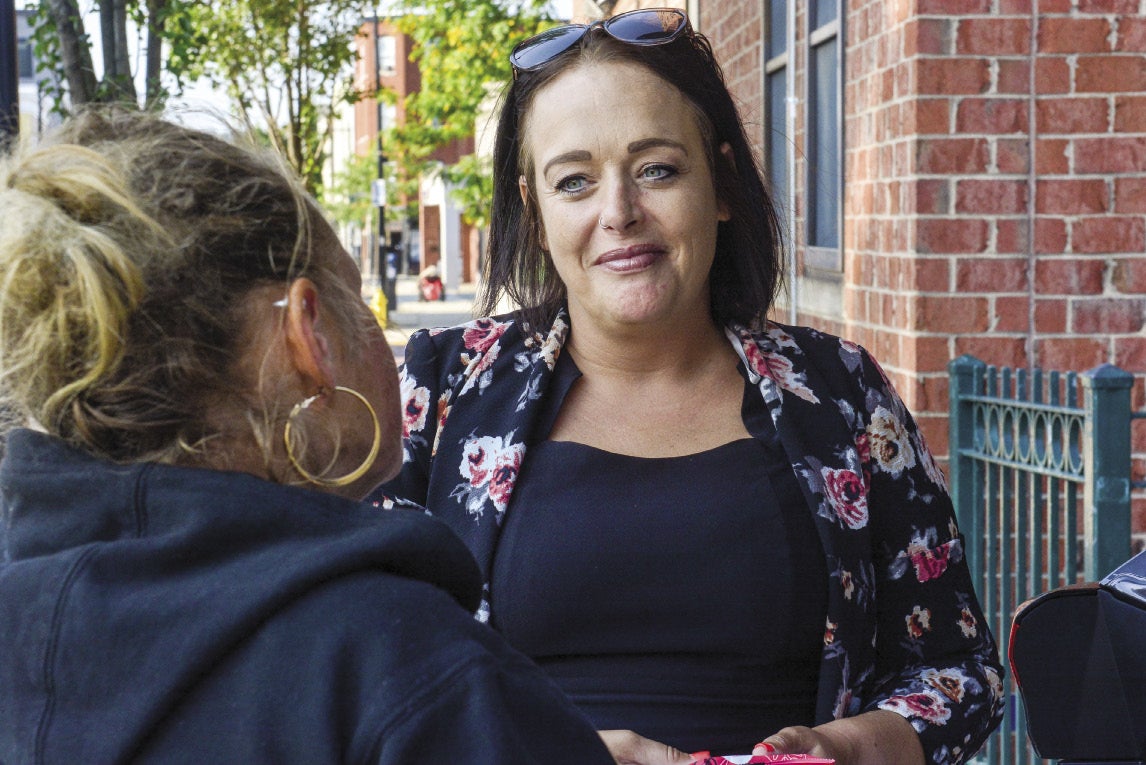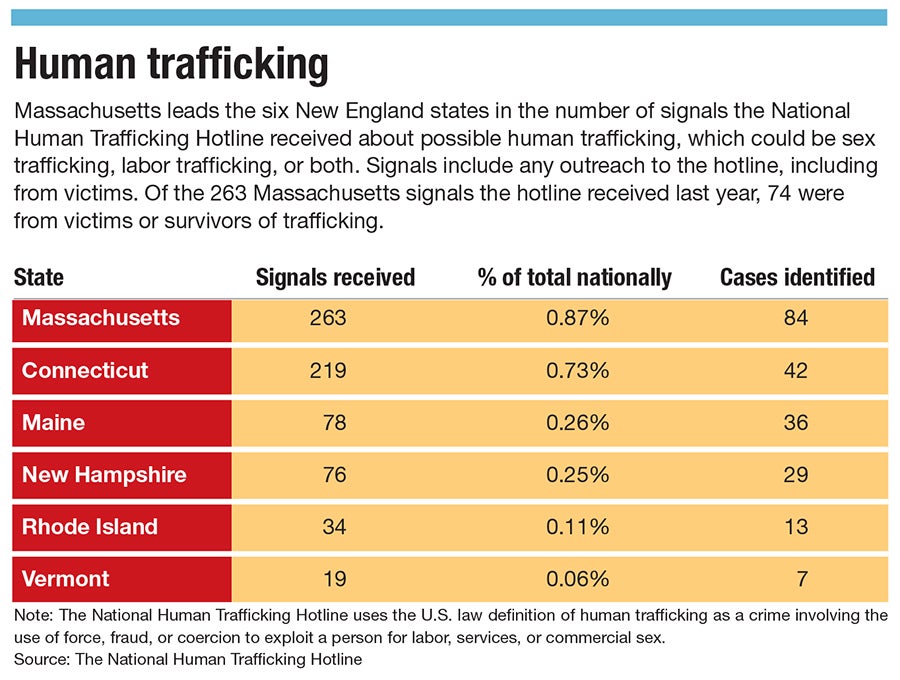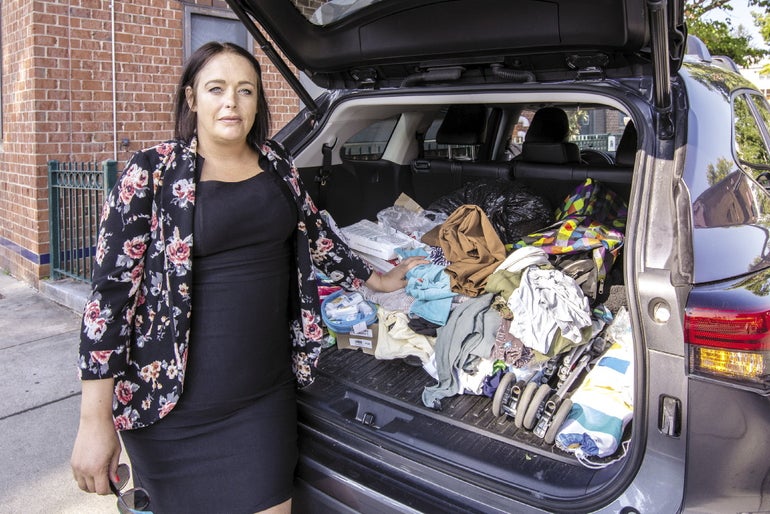Bell-Peña and the nonprofit she founded are now hard at work again addressing the original core mission: Supporting those exploited by the sex trade.
Get Instant Access to This Article
Subscribe to Worcester Business Journal and get immediate access to all of our subscriber-only content and much more.
- Critical Central Massachusetts business news updated daily.
- Immediate access to all subscriber-only content on our website.
- Bi-weekly print or digital editions of our award-winning publication.
- Special bonus issues like the WBJ Book of Lists.
- Exclusive ticket prize draws for our in-person events.
Click here to purchase a paywall bypass link for this article.
Nikki Bell-Peña felt as though she had become the token survivor.
In early 2023, she was still working as the founder and CEO of Living in Freedom Together, a Worcester nonprofit working to end the sex trade. At the same time, she was advocating for herself and others she said were sexually exploited by community leaders by initiating a civil lawsuit against the city’s St. John’s Catholic Church and calling upon the U.S. Department of Justice to take action.
“Everything just became really overwhelming for me, and I couldn't manage it; and I didn't have the support system that I needed,” she said.

In March 2023, Bell-Peña relapsed and was subsequently let go by LIFT that May. LIFT's board named Audra Doody and Courtney Ross Escobar as co-executive directors, both of whom had been with the organization since 2017. The transition wasn’t easy for anyone.
Eighteen months after their very public split, Bell-Peña and the nonprofit she founded are now hard at work again addressing the original core mission: Supporting those exploited by the sex trade. But they are fulfilling that mission completely separately and in entirely different ways.

Doody and Ross Escobar have worked to redefine LIFT’s mission, now operating under the name Safe Exit Initiative, and embarked on new service ventures, including researching the underlying issues with the sex trade.
Meanwhile, Bell-Peña has celebrated a year of sobriety as she’s in the process of starting a brand-new nonprofit. While building her new venture, she’s back doing what made her founding of the survivor-led LIFT so notable: directly supporting people in the sex trade.
Starting over
After relapsing, Bell-Peña rendered herself homeless because she refused to use around her children. She lived in active addiction for six months, accessing treatment on and off until she walked into Worcester City Hall and said she needed help. The City’s Health & Human Services team got Bell-Peña to a hospital, where she needed treatment for a medical issue, resulting in a five-day stay at the facility.
Similar to past times she had entered recovery, Bell-Peña said getting sober meant an intrinsic shift had to take place, and watching her young son as he was leaving her hospital room was that shift.
“He wanted me to come with him, and I couldn't,” she said. “That look on his face … I said ‘I'm never doing that again.’”
When Bell-Peña entered treatment in 2023, she had a community of support, she said. But when she left that program not in recovery, everyone who had been there pulled away.
“I was left completely isolated and alone and without support, which led me to be further exploited and further marginalized,” she said.
This reason is why Bell-Peña doesn’t use sobriety, or even the goal of sobriety, as a barrier to receiving support in the outreach work she does.
While her new organization is still in its infancy, Bell-Peña has already written its bylaws, formulated its board, and submitted the materials needed to obtain nonprofit status. Simultaneously, she has been working out of the trunk of her car, driving around the city providing clothes, cosmetics, and hygiene products to women engaged in the sex trade. She said she has even started to help women get into treatment, with many expressing their want to join her and her mission when they’re sober.
“All these girls that I'm working with and treating, they're like ‘Can I come work with you when I get better?’ and I'm like ‘Yes, you can. That's exactly what you can do,’” she said.

Bell-Peña is initially looking to rent a space and establish a drop-in center for women in the sex trade with the goal to eventually open another program, such as a shelter as LIFT once did. Through her nonprofit, she plans to offer peer support, advocacy, and substance-use disorder treatment while working to push for legislative action for partial decriminalization of the sex trade: a model enforcing legal penalties for sex buyers and not the prostituted individuals.
Bell-Peña is already working to ready herself for the courtroom. She’s going to school part time to earn her associates degree in human services and will transfer to a bachelor’s program in criminal law. She will again start her organization as survivor-led, which she believes is essential to the work she does.
“Nobody knows how to survive prostitution and the journey out like somebody that has lived it,” said Bell-Peña. “If you haven't been there, you don't know the solutions, and that's why I think it's critical that survivors are at the forefront of everything that we do.”
Though the road to those solutions is not always straightforward, Bell-Peña said she does the work because she can't leave behind the women who gave her kindness and compassion when she was beside them in the sex trade.
“It makes me feel like I survived for a reason,” she said. “This work is always going to be a part of me.”
Redefining the mission
When Doody and Ross Escobar were named co-executive directors of what is now Safe Exit Initiative, they took one big step back to analyze what their organization was, what they were good at, and how they could change to best support their participants. When they did, they decided the nonprofit’s previous mission to end the sex trade wasn’t as accessible or as accurate as they had once thought.
“We're not ending the sex trade,” said Ross Escobar. “It even sounds bizarre to me, but that's not what we're here for.”
What SEI is here for is supporting women who have experiences in the sex trade by providing resources and services no matter what their past or future holds. While the organization has participants actively trying to exit prostitution, SEI also has those who don’t identify with a mission to end the sex trade and who want to stay in the life, said Doody.
“And that's completely okay,” she said. “We support people with lived and living experience.”

With SEI’s shift in mission came a reevaluation and refinement of what services the organization was providing. In September 2023, the organization chose to shut down the overnight shelter component of its community-based resource center HARBOR. The decision to close the shelter’s operations was in part due to lack of funding, but was also a strategic move away from providing housing services. In fact, SEI turned down funding awarded to them by the Massachusetts Department of Public Health to build transitional housing.
“We just decided we don't want to be in the housing game. That's not our area of expertise; we're here for harm reduction, recovery, and policy and advocacy,” said Ross Escobar.
Thinking of closing HARBOR’s shelter still makes Doody choke up, but she said closing was the right choice and one of the better decisions the duo made in regards to finances, stability, and organizational capacity. The closure even helped move patients into treatment and transitional housing, she said.
New beginnings
To support their participants most effectively, Doody and Ross Escobar came to the conclusion SEI needed to work to address the underlying systemic issues of the sex trade, including misogyny, racism, homophobia, poverty, and educational inequities.
As a result, SEI moved its policy and advocacy work to the forefront, establishing its Policy & Research Practice. The sex trade is understudied, and therefore best practices haven’t been developed to provide the best types of services for those with lived or living experience, said Ross Escobar.
To address this concern, SEI has begun its first research initiative through its PRP having received a $160,000 award from the Massachusetts Gaming Commission to conduct a two-year study of the relationship between sex trafficking and casinos. The nonprofit is in the process of recruiting a researcher with the study slated to start in early 2025.
Under Doody and Ross Escobar’s leadership, SEI has built out its training and education department, aimed at equipping law enforcement, healthcare professionals, and community service providers with the knowledge necessary to best support those in the sex trade.
In August, the organization celebrated the reopening of HARBOR following extensive renovations. Having operated from 8 a.m. to 8 p.m. since the closing of its overnight shelter, the resource center and day shelter is now equipped with a fully functional kitchen, donation closet, and refurbished first floor as it provides essential services from harm reduction supplies and case management to showers and hot meals.
While SEI has experienced a number of salient changes in the past year and a half, the organization’s values have stayed consistent, said Doody.
“Even though our operating hours may look different, we're still treating every person that walks into either this location or Jana's Place with unconditional positive regard,” she said. “They're welcome just as they are.”
Mica Kanner-Mascolo is a staff writer at Worcester Business Journal, who primarily covers the healthcare and diversity, equity, and inclusion industries.

